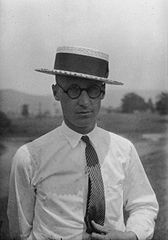
Prompted by a lacuna in Iain Ellis’s column “Mr. Mencken Went to Dayton and the Culture Wars Began,” posted at PopMatters (September 18, 2014), I was discussing what happened after the close of the Scopes trial in 1925. All along, the defense expected to lose the case, to appeal the verdict, and to win a victory at the appellate level. Accordingly, Scopes’s lawyers entered objections—“exceptions,” as they were called—to those of Judge Raulston’s decisions during the trial that a higher court might be convinced to reverse. As I explained in part 1, because Darrow was in bad odor with the ACLU after his devastating examination of Bryan, especially since Bryan died shortly after the trial, the erratic Tennessee lawyer John Randolph Neal Jr. was entrusted with the appeal instead. True to form, Neal (as Edward J. Larson writes in his Summer for the Gods [1997]) “missed the deadline for filing the bill of exceptions with the state supreme court,” thus precluding “the defense from appealing any issues relating to the conduct of the trial—including the ruling on expert testimony.”
As a result, practically every good argument that Scopes’s lawyers could have used in pursuing the appeal, including the stellar testimony from the scientific expert witnesses that was included in the record of the trial, was unavailable. Due to Neal’s failure to communicate with his colleagues, the appellant’s legal team was in further disarray: as late as December 1925 it was still not decided who would argue the appeal. But the appellee’s legal team wasn’t in great shape either. Governor Austin Peay, who spent the trial at a sanitarium in Battle Creek, Michigan, which provided no refuge from the stress of reading the press coverage, and his attorney general Frank M. Thompson were both concerned about their ability to give the defense of the Butler Act the attention that it deserved in light of their chronic illnesses. (Both men died in office.) There were also squabbles about whether to accommodate the outside attorneys, Samuel Untermyer and William Jennings Bryan Jr., who had been invited by Bryan to participate. Both sides submitted their lengthy briefs to the Tennessee Supreme Court in December 1925.
Oral argument took place before the Tennessee Supreme Court starting on May 31, 1926, allowing a more-than-usual two days for the proceedings. As in Dayton, the courtroom was packed and sweltering in the summer heat. In the audience were John Washington Butler, who introduced the act under which Scopes was prosecuted, and George Rappleyea, who orchestrated the arrest of Scopes for violating it. Speaking for the appellee, the state, were Nashville attorneys Ed T. Seay and K. T. McConnico. (The latter was not above leveling personal attacks against opposing counsel: the court eventually told him to “confine himself to the case before the court.”) Speaking for the appellant, Scopes, were Neal, representatives of the Unitarian Layman’s League and the Tennessee Academy of Science (both of which submitted amicus briefs), Arthur Garfield Hays (who like Neal represented Scopes during the trial), the Memphis attorney Robert S. Keebler, and Darrow, who gave a typically sweeping closing statement. “Despite rhetorical flourishes on the final day,” Larson observes, “the appellate hearing failed to stir passions.”
And then it was the waiting game until January 15, 1927, when the court gave its opinion. (It was speculated that the delay was so that the case would not interfere with the election campaigns of the justices; Scopes himself took it as a sign that they intended to overturn the statute.) There were five justices on the court, but Justice Swiggart recused himself, because he had, before joining the court to replace Justice Hall, who died after the oral arguments, helped to argue the prosecution’s case. The remaining four justices produced no fewer than three different opinions, none of which used the scientific expert testimony. Justice McKinney said that the Butler Act was too vague to be enforced. Justice Chambliss agreed that it was vague but insisted that it was not so vague as to be unconstitutional. He understood the Butler Act to ban only teaching evolution in such a way as to imply that the Bible was wrong, however, so he concluded that Scopes didn’t violate it. For the majority, Chief Justice Greene and Justice Cook held that the Butler Act was constitutional and that Scopes had violated it.
Yet, the court observed, Judge Raulston had decided the fine, opting to impose the minimum possible fine of $100 under the law. Under Tennessee state law, the jury had to decide the amount of any fine greater than $50. So the judgment of the trial court was therefore reversed. (There was some suspicion that Judge Raulston had in fact cunningly engineered the result to save face all around.) The state could have retried Scopes, but didn’t, following the court’s advice, “We see nothing to be gained by prolonging the life of this bizarre case,” thus frustrating the ACLU’s hope of taking the case to the United States Supreme Court. Of course, a retrial would have been strange, for Scopes no longer was in Tennessee or in the teaching profession. By then, he was engaged in graduate study in the geology department at the University of Chicago (see “Whatever Happened to Scopes?”). No teacher was thereafter prosecuted under the Butler Act before it was repealed, thanks in part to the filing of cases against antievolution laws and in part to the publication of Scopes’s memoir Center of the Storm (1967), in 1967.

